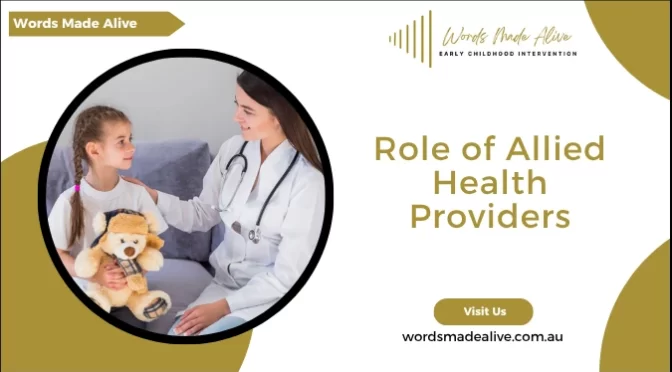When it comes to improving your health, Allied Health professionals in Melbourne help you with developing day-to-day living. They take evidence-based approaches with their practical, hands-on approach. They also boost your independence and enhance your overall well-being.
Allied Health providers don’t just focus on your physical health, but also on your mental state. They help you develop social connections and your ability to do the things you love. As specialists, they also work with you so you can live an enriched life.
Let us now take a look at how Allied Health Care providers in Melbourne elevate your lifestyle.
Building Blocks for Physical Well-being
Your physical health is a core foundation. Allied Health professionals such as physiotherapists and Exercise Physiologists play a very important role here since they don’t just treat pain; they also help build strength, balance, and mobility.
Whether you are recovering from an injury, managing arthritis or a similar chronic condition or want to get to a place of your choice, the professionals will help you by creating and implementing tailored exercise plans. This approach reduces pain, prevents future injuries, and gives you the freedom to live life the way you need.
Boosting Confidence and Mental Wellbeing
If you are struggling to communicate or perform everyday tasks, it can leave you frustrated. This is where Occupational Therapists (OTs) and Speech Pathologists come in. They work as a life coach for your daily routine. They evaluate your home, hobbies, and goals to find clever ways to make things easily.
They recommend aids and equipment if required and help you break down tasks into manageable steps. This way, you regain the ability to accomplish daily tasks such as making a cup of tea, dressing independently, or managing your budget with confidence.
Similarly, a Speech Pathologist can help you communicate effectively, which is necessary to connect with others. They also work on managing dysphagia while ensuring safe and enjoyable mealtimes.
Managing Chronic Pain and Fatigue
An Exercise Physiologist will design a safe, gentle activity program to help you better manage energy levels while reducing pain, making daily tasks less exhausting. They will take the time to understand the problems you face and assist you accordingly.
Nourishing Your Social and Emotional Health
The foundation of wellbeing is staying connected with others. So, as part of Allied Health services in Melbourne, psychologists and dietitians play key roles.
They provide you with the tools to manage stress, anxiety, and the emotional challenges that stem from disabilities or chronic illnesses. They help develop coping strategies so you can maintain relationships and participate in your community.
A Dietitian does more than just give out meal plans. The professional will help you understand how food fuels your body and mind, and why proper nutrition is necessary. With their guidelines, you can perform physio exercises and engage in social outings.
Final Words
Allied Health Providers are your NDIS partners in making your life more enriched. They focus on your strengths and work with you so you can achieve your personal goals. They address the physical, mental, and social aspects of your life. Most importantly, they help you build a stronger, happier, and more independent you. That’s why it is important to hire an experienced Allied Health provider.
Frequently Asked Questions
1. What’s the main difference between a Physiotherapist and an Exercise Physiologist?
A Physio often focuses on diagnosing and treating acute pain and injury, while an Ex Phys specialises in using exercise to manage chronic conditions and improve long-term health.
2. How can an Occupational Therapist (OT) actually help me at home?
An OT does a home visit to see your daily challenges firsthand, then provides practical strategies and tools to make tasks like cooking, bathing, or dressing safer and easier.
3. I can talk fine. Why would I need to see a Speech Pathologist?
Speechies do more than help with speech. They are crucial for people with swallowing difficulties (dysphagia), ensuring safe eating and drinking to prevent choking or malnutrition.
4. Can an Allied Health team help with mental health, or do I just need a psychologist?
While a psychologist is key, your entire team boosts mental health. An OT builds confidence in daily tasks, and a Physio reduces pain, which collectively lowers anxiety and improves mood.
5. What does an Exercise Physiologist do for chronic fatigue that’s different from just resting?
They prescribe very specific, graded exercise to slowly build your tolerance and energy levels, which is more effective long-term than complete rest alone.
6. How is an Allied Health approach different from just seeing my GP?
Your GP manages your overall health, but Allied Health provides the hands-on, specialised therapy and training to actively build your skills, strength, and independence day-to-day.
7. Can a Dietitian help if my weight is fine?
Absolutely. A Dietitian isn’t just about weight loss. They advise on how food can improve your energy, support muscle recovery after physio, and even boost your mood.
8. What does a typical first session with an OT involve?
It’s a collaborative chat about your goals, routines, and challenges, followed by a practical assessment of your abilities to create a personalised plan for your home life.
9. How do these providers work together for my care?
They communicate as a team. Your Physio might tell your OT about your mobility progress, so they can adjust your home activity plan accordingly for seamless support.
10. I want to get back to my hobby (e.g., gardening). Who should I talk to?
An Occupational Therapist is your go-to. They specialise in breaking down hobbies into achievable steps and can recommend adapted tools or techniques so you can get back to what you love.
Contact Us to Discuss Your Requirements
To discuss your health needs with Words Made Alive, call us or fill out the form on the Contact Us page and submit the details so we can get in touch with you.
 For a free consultation:
For a free consultation: 







